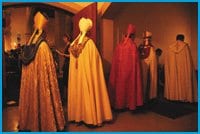“Be yourself,” was the message of Archbishop Of York John Sentamu in his sermon celebrating the election of Frederick Hiltz as the new archbishop of the Anglican Church Of Canada (ACC) at the church’s General Synod in June.
But the leadership was sending mixed messages. Even pro-gay Anglicans dodged making explicitly pro-gay statements. The church voted that there’s no doctrinal reason to disapprove of gay unions but Canadian Anglican clergy are still not allowed to bless them.
The outcome would have been different had even one antigay bishop changed his mind.
“Homosexual behaviour is not in line with scripture of my prayer book,” said bishop Larry Robertson in a Jun 23 debate. “We can call it sin. My desire is for people to be whole and come back into line with God’s will.”
Canadian Anglicans meet once every three years to debate policy and elect a new leader. The question of blessing same-sex marriages is one that was carried over from the 2004 meeting and will be discussed again in 2009. In fact, the Anglicans have been talking about homosexuality since at least 1979.
At the reception following Hiltz’s installation, the mostly elderly and white Synod participants were very cautious.
“It’s a really lovely tradition,” says volunteer Marie Chalmers. About the same-sex blessing debate, Chalmers says, “I’d rather not comment on that.”
Hitlz says that the Synod’s decision only means that the Anglican Church needs more time.
“Well, we’ve been talking about it for 30 years,” he says. “I think people are looking to the church to make a statement, a decision one way or the other. The outcome of the decision, for many people was very painful — for gays and lesbians — because it means we’re into another three years of further study and discernment.
“And for others, who welcome that time for discernment and study, it was a very good decision… I am certainly prepared, if the Synod were to move in that direction, I would be supportive of [same-sex blessings].”
Asked about how the decision will affect the ACC’s relations with other churches in the Anglican fellowship, Hiltz says that the three-year delay is good news.
“We’re not moving, as some people would say, unilaterally, or too quickly,” he says.
“I very much support the blessing of same-sex unions,” says Rev Wayne Mackintosh of St John’s-Fort Frances. Because I think it’s a question of acceptance, a question of justice, for all people — we baptize all people, and we should be honouring and respecting their relationships.” The Synod worked hard to discern God’s will — and will keep working, says Rev Canon Murray Still, an aboriginal mission developer in the Diocese of Rupert’s Land, in Northern Manitoba.
“We chose not to bless same-sex unions at this time,” says Still. “The bishops gave us their wisdom, that we need more time for discussion, more time for getting more knowledge and more discussion in our communities, in particular the aboriginal communities.
“We have a lot of work to do in our aboriginal communities to make sure we feel inclusion in the church, so we’re working hard at that; our church is patient, and onside with us.” He adds that the election of the Anglican Church’s first-ever indigenous bishop, Mark MacDonald, was an important step.
The installation was held at St Matthews Church, in an inner-city neighbourhood in Winnipeg. A group of local teens, all black, danced at the closing ceremony.
“The most interesting part [of the Synod] was the way people were together, right?” says 14-year-old Rebecca Garang, a dancer for the Youth Immanuel of St Matthews. Garang thought the same-sex blessing debate was “very nice, very entertaining … and that’s all I have to say about that.” “They were singing and dancing and enjoying stuff, so mostly everyone was communicating together.”
In an historical first, the runner-up for Primate was a woman.
The Synod invited delegates from the Episcopal (US Anglican), United and Lutheran Churches, in addition to representatives from the local Jewish and Muslim communities.
Gail Allen, an ecumenical officer and coordinator for Interchurch and Interfaith with the United Church, says she was impressed by the communication and “how people listened to each other.”
She says she hopes that in future debates on same-sex blessings, the Anglican Church will enable everyone to listen to each other, and, eventually agree with the United Church and bless same-sex marriages.
“Obviously there is disappointment for those who had hoped for a wider circle and a greater sense of inclusion … I guess I hope that the Anglican Church will find ways of healing that enable everyone to listen to each other.”
“I hope that we’ll be able to remain — well, be — with our brothers and sisters in the Anglican Church as they look for ways to do that,” Allen says.
“Some people are very upset about the bishops’ decision,” says Ben Stewart. “I’m not sure.” Asked if the bishops have too much decision-making power, he replies, “A lot of people have been saying that.”
David Ball, a parishioner at St Matthews, thinks the same-sex blessing issue will keep coming up.
“It’s so clear that the laity and clergy are behind it,” he says. “So it’s only two bishops off.”
Ball and Gwen McAllister, both involved with the Student Christian Movement Of Canada, question the role the bishops played in voting down the blessing of same-sex marriages.
“There’s something beautiful about the traditions and stuff — the robes, and the ceremony — so I wouldn’t want to get rid of it,” says Ball, “but [the bishops] should listen to the people.”
“It makes me wonder who gets made a bishop, and why,” says McAllister. “How it is that the people who become bishops aren’t necessarily representative of the laity?”

 Why you can trust Xtra
Why you can trust Xtra


